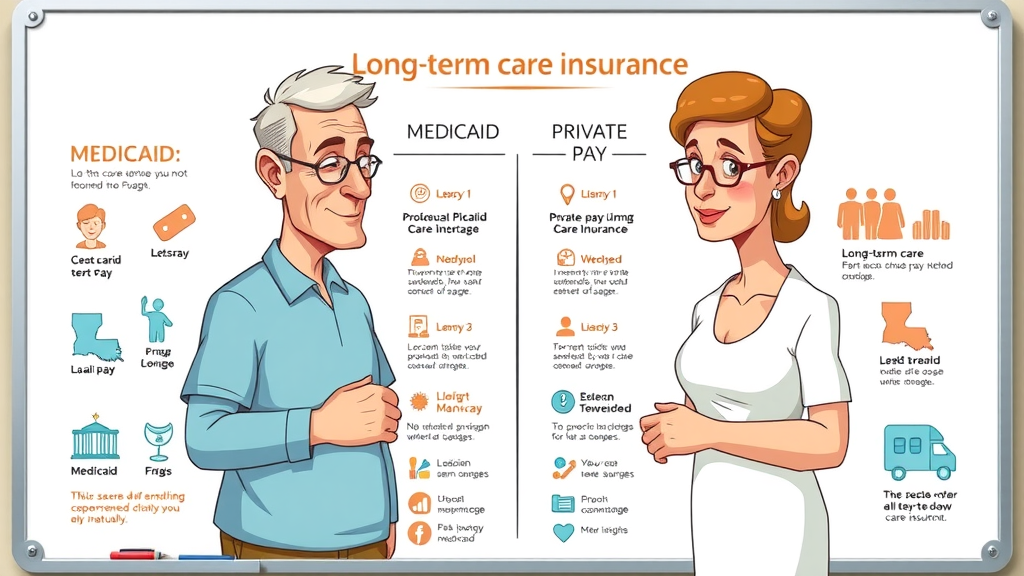- Did you know over 65% of Louisiana’s nursing home residents rely on Medicaid for their long-term care? Medicaid nursing home coverage in Louisiana is essential for thousands of families. This guide will equip you with everything you need to claim your benefits and protect your loved ones.

Understanding Medicaid Nursing Home Coverage Louisiana: What Every Family Must Know
- Overview of Medicaid nursing home coverage in Louisiana
- Why Medicaid is the primary payer for nursing home care in the state
- Explanation of the relationship between Louisiana Medicaid, nursing homes, and term care services
Medicaid nursing home coverage Louisiana stands as the foundation of long-term care for seniors and disabled adults across the state. Louisiana Medicaid provides comprehensive care benefits to qualifying individuals who require nursing home care, ensuring they get the necessary level of care without depleting their life savings. The Medicaid program is designed to foot the bill for term care services—including skilled nursing, room and board, meals, therapies, daily living, and even medication management—once financial and medical eligibility requirements are met.
Why is Medicaid the primary payer in Louisiana? The answer is simple: private pay options for nursing homes are prohibitively expensive, and long-term care insurance is often complicated or out of reach. This makes Medicaid eligibility a crucial lifeline for many families seeking nursing home placements. In Louisiana, Medicaid’s partnership with certified nursing homes means care benefits are offered across a network of facilities, providing assurance for families during difficult transitions.
The relationship between Louisiana Medicaid and nursing homes is both financial and regulatory. Facilities must meet strict standards and work directly with the Department of Health to deliver approved term care benefits. Medicaid ensures not only coverage for care services but also quality and oversight, making it indispensable for those in need of long-term care.
| Feature | Medicaid Nursing Home Coverage Louisiana | Private Pay | Long-Term Care Insurance |
|---|---|---|---|
| Coverage | Comprehensive | Limited | Variable |
| Eligibility | Income & asset limits | No restrictions | Medical underwriting |
| Cost | Low/none (for eligible) | High | Moderate-high |

What You'll Learn in This Guide to Medicaid Nursing Home Coverage Louisiana
- How to determine Medicaid eligibility for Louisiana nursing homes
- The asset and income limits affecting medicaid nursing home coverage Louisiana
- The application process for term care benefits
- How to protect your assets and ensure long-term care through Louisiana Medicaid
- Steps to report neglect and secure legal support
By the end of this guide, you’ll have a clear roadmap for securing Medicaid nursing home coverage Louisiana —from verifying eligibility requirements and asset limits, to navigating the application process and maximizing your care benefits. We’ll deliver practical insight on protecting what you’ve earned and responding if your loved one experiences neglect or financial vulnerability in a nursing home setting.
This is your trusted resource, whether you’re a Baton Rouge family, a community spouse worried about home equity, or a Louisiana resident seeking to plan ahead for term care benefits. Let’s demystify the process together and equip you with actionable steps to achieve quality long-term care in Louisiana.
Key Medicaid Eligibility Requirements for Nursing Home and Term Care Benefits in Louisiana
Income Limit and Asset Limit for Medicaid Nursing Home Coverage Louisiana
- Maximum monthly income for eligibility
- Current Medicaid nursing home asset limit (individuals/couples)
- Exempt vs. countable assets explained
- Financial strategies for protecting assets
Eligibility for Medicaid nursing home coverage Louisiana hinges primarily on strict income limit and asset limit rules. In 2024, individuals must typically have a monthly income below $2,829, while couples face slightly higher thresholds. The asset limit is usually $2,000 for an individual applicant, though some resources—like a primary residence, certain life insurance, and an automobile—are considered exempt assets under Louisiana Medicaid rules.
Exceeding the income limit or holding more than the allowed asset limit can mean disqualification from essential term care benefits. However, with careful Medicaid planning—like strategic spending down, using qualified income trusts, and protecting a spouse’s resources—families can retain vital assets while still qualifying for care services. Understanding what counts as a countable versus exempt asset is critical for successful application and long-term financial stability.
Navigating these requirements may also involve complex legal details—such as the Medicaid look-back period for asset transfers, or how home equity is treated. Engaging a Medicaid planner or elder law attorney can ensure you manage these complexities, reducing risk and optimizing protection for your family.

"Meeting the right eligibility requirements is the difference between overwhelming out-of-pocket costs and full coverage for nursing home care services in Louisiana."
Step-by-Step Medicaid Eligibility Process for Louisiana Nursing Homes
- Determining Medicaid levels of care
- Medical and functional criteria
- Role of a Medicaid planner in navigating eligibility
Step one in securing Medicaid nursing home coverage Louisiana is a detailed evaluation of your medical condition to determine the required level of care. A healthcare assessment gauges your need for assistance with activities of daily living (ADLs) such as bathing, dressing, eating, toileting, and mobility. Only if these needs meet the Louisiana Medicaid threshold for nursing home admission does the application process proceed.
After meeting the functional criteria, financial screening happens: your monthly income and assets are reviewed against the Medicaid eligibility standards. This often requires collecting documents regarding Social Security benefits, pensions, life insurance cash values, bank statements, and property ownership. The look-back period —usually five years for asset transfers—can delay eligibility if not properly managed, and may lead to penalty periods.
Working with a certified Medicaid planner or elder law specialist is highly recommended. Their expertise streamlines paperwork, maximizes qualifying deductions, and prevents costly errors. Importantly, a planner can also alert you to changes in eligibility requirements or state regulations, such as updates to the income limit or asset threshold.
How Medicaid Nursing Home Coverage Louisiana Pays for Term Care Services
Types of Care Services Provided Under Louisiana Medicaid
- Skilled nursing home care
- Physical, occupational, and speech therapy
- Medication and daily living assistance
- Specialized long-term care services
Once eligibility is established, Louisiana Medicaid covers a comprehensive variety of care services designed for nursing home residents. These include 24/7 skilled nursing, medication administration, chronic disease management, rehabilitation therapies (such as physical, occupational, and speech therapy), and essential support for activities of daily living like bathing and eating. For residents with complex medical conditions, Medicaid also pays for certain specialized term care services , addressing both acute and chronic needs.
In addition, Medicaid-certified facilities guarantee meals, laundry, social activities, and transportation for medical appointments. The program relieves Louisiana families of significant cost of care burdens, freeing loved ones to focus on their family’s well-being. While nursing home residents get the greatest share of benefits, some home and community based services are likewise available for those eligible for Medicaid but able to remain safely in their own home.
The combination of full coverage for room, board, and care benefits makes Medicaid long-term care uniquely vital—even as costs in nursing homes continue to rise. It’s not just a program for the poor; it’s a necessary pillar of elder care across Louisiana, one that every household should understand and utilize if needed.

Medicaid Long Term Care Benefits Versus Home and Community Based Services
- Comparing facilities: nursing home vs. home care options
- Eligibility and coverage differences
- Benefits and drawbacks of each under Medicaid
Medicaid long term care benefits are not limited to institutional settings. Many Louisiana residents may prefer to age at home or within their community, making home and community based services (HCBS) a viable alternative. While both nursing homes and HCBS options are covered by Louisiana Medicaid, key differences include the intensity of support, eligibility requirements, and service caps.
Nursing homes provide round-the-clock medical supervision and support, making them essential for those unable to safely live alone or with family. In contrast, HCBS may involve less supervision but greater independence—services such as in-home nursing, personal care for daily living, and adult day programs. However, these community-based options may have waiting lists and coverage may be more limited depending on level of care needs.
When weighing their options, families should compare term care benefits , financial implications, and the personal preferences of the loved one. Consult your Medicaid planner about the eligibility requirements, cost-sharing, and pros and cons for each path before making a decision.
| Service | Nursing Homes | Home & Community Based |
|---|---|---|
| Round-the-clock Care | Yes | No |
| Eligible Under Louisiana Medicaid | Yes | Yes |
| Cost-sharing | Minimal | Variable |
How to Apply for Louisiana Medicaid Nursing Home Coverage: A Step-By-Step Guide
- Application timeline and documentation checklist
- Legal requirements for Medicaid long term care benefits
- Working with Medicaid planners and legal experts
- Common mistakes when applying for Medicaid in Louisiana
Applying for Medicaid nursing home coverage Louisiana involves detailed planning and documentation. Applications can be submitted via the Louisiana Medicaid website, Department of Health offices, or with the help of certified Medicaid planners. The application timeline can vary, but expect four to eight weeks for review—complex cases, or missing documents, can stretch this longer.
Your checklist should include Social Security numbers, proof of residency, birth certificates, financial statements for the past five years (for the look-back period), property deeds, home equity records, and insurance policies (including life insurance). It’s vital to meet every legal requirement —missing information leads to costly delays.
For best results, consult a trusted Medicaid planner or attorney, especially if there are complicated finances, multiple properties, or potential transfer penalties in play. Avoid the most common application mistakes—including outdated documentation, missed spend-down opportunities, or incomplete financial disclosures—to ensure eligibility for valuable term care benefits .

Strategies to Protect Your Asset Limit and Income When Qualifying for Louisiana Medicaid
- Spend-down rules explained
- Gifting, trusts, and legal strategies
- Protecting a spouse and family home
- When to consult an elder law attorney
Louisiana’s strict asset limit and income limit highlight the need for informed Medicaid planning . Spend-down rules allow you to reduce excess resources by paying legitimate debts, prepaying funeral expenses, or making needed home modifications before applying. However, giving away money or property can trigger transfer penalties under the Medicaid look-back period .
Advanced strategies include creating irrevocable trusts, utilizing the “community spouse resource allowance” to protect a spouse’s finances, and leveraging exempt assets like home equity (up to allowable limits). Each tactic carries legal and timing implications, underscoring the value of an elder law attorney’s guidance.
Families seeking to safeguard their financial future must act early and avoid unintentional mistakes. A knowledgeable expert ensures compliance with eligibility requirements while minimizing loss—don’t leave your family’s finances to chance.
"Louisiana’s asset and income limits mean careful planning is essential—don’t risk your family’s financial future."
Understanding the Cost of Nursing Home Care Versus Medicaid Coverage in Louisiana
- Average yearly cost of private nursing homes in Louisiana
- Cost savings with Medicaid nursing home coverage Louisiana
- Other options for term care benefits and services
The cost of care in private nursing homes averages $70,000–$90,000 per year in Louisiana, with higher rates in cities like Baton Rouge. For most families, these expenses swiftly erode life savings. Medicaid nursing home coverage Louisiana , by contrast, covers virtually the entire cost for eligible residents—requiring only a share of monthly income (often Social Security or pension) as a contribution.
This financial protection is the primary reason so many Louisiana residents seek Medicaid coverage when nursing home placement is needed. It shields the family home, enables continuity of care services, and removes the burden of unmanageable expenses for spouses and children. Those still in the medically needy category, or who miss the spend-down period, are at risk for high out-of-pocket payments.
Families should also explore other term care benefits , such as home and community based services, if institutional care is not yet needed. No matter the choice, diligent planning helps maximize Medicaid coverage and ensures loved ones receive the best care possible at an affordable rate.

Common Questions About Medicaid Nursing Home Coverage Louisiana: People Also Ask
Will Medicaid pay for nursing homes in Louisiana?
- Medicaid covers nursing home care for eligible Louisiana residents who meet medical necessity and financial criteria. Coverage includes skilled nursing, room and board, and necessary health-related services.
Yes, Medicaid pays for nursing home care in Louisiana for residents who meet medical and financial standards. This means that if you qualify, Medicaid will cover room, board, nursing, and vital care benefits—ensuring you or your loved one receive comprehensive term care without the threat of mounting debt. Eligibility is determined by income, asset limit, and the required level of care.
How much will Medicaid pay for nursing home care?
- Louisiana Medicaid pays the full cost of care in certified nursing homes, minus the personal income that must be contributed by the resident, ensuring comprehensive term care.
Louisiana Medicaid typically pays the entire cost of certified nursing home care once you qualify, less your required monthly contribution (usually based on Social Security or other income). This contribution is known as the “patient liability.” For those with limited income, Medicaid essentially guarantees full coverage after the patient share is applied.
Top 7 Mistakes to Avoid When Pursuing Medicaid Nursing Home Coverage Louisiana
- Failing to verify Medicaid eligibility requirements
- Ignoring asset and income limits
- Missing documentation deadlines
- Overlooking home and community based alternatives
- Not consulting a Medicaid planner
- Incomplete spend-down strategies
- Delaying legal and financial planning

Expert Insights: Quotes from Louisiana Medicaid and Long Term Care Specialists
"Navigating Medicaid for nursing homes in Louisiana is challenging, but the right guidance unlocks essential care benefits for families in need."
Frequently Asked Questions on Medicaid Nursing Home Coverage Louisiana
- What documents are needed for a Medicaid nursing home application? Gather Social Security cards, Medicaid forms, proof of Louisiana residency, income and asset statements, five years of bank records, home equity documents, and insurance policies. Any missing paperwork may delay approval.
- Can I keep my house if I qualify for Medicaid in Louisiana? In most cases, your primary home is exempt under asset limit rules while you are living or expect to return there. Consult a Medicaid planner about your home equity limit and protection strategies.
- How are income limit and asset limit calculated? The income limit is set annually by Louisiana Medicaid, typically based on monthly income. Asset limit is generally $2,000 for individuals, but some assets (like a home) don’t count. Calculations must include both countable resources and exempt assets.
- What are the penalties for transferring assets before applying? Medicaid imposes penalty periods for transferring assets within the five-year look-back period before applying. These penalties can delay coverage—avoid gifting assets without legal consultation.
- Is Medicaid coverage for term care services permanent? Medicaid coverage usually remains as long as you continue to meet eligibility requirements, including continued medical need and asset/income compliance, subject to periodic reviews and renewals.

How to Report Nursing Home Neglect and Access Legal Support in Louisiana
- Signs of neglect and abuse in Medicaid-certified nursing homes
- Steps to report suspected neglect or abuse
- How Louisiana lawyers can help families secure justice and restorative care
Nursing home neglect or abuse is an unfortunate reality that families must remain vigilant about—even in certified facilities. Warning signs include unexplained injuries, declining hygiene, unexplained weight loss, emotional withdrawal, or sudden changes in behavior. Medicaid-certified nursing homes are required to meet high standards, but lapses do occur.
To report suspected neglect, contact Louisiana Department of Health or Adult Protective Services immediately. Gather documentation, dates, witness statements, and medical reports for your complaint. For urgent or life-threatening issues, call 911 without delay. Proactive reporting not only helps your loved one but protects others as well.
Consulting a Louisiana lawyer experienced in elder care is crucial if you encounter pushback or need to pursue civil action. Legal professionals can advocate for your family, enforce term care benefits, and secure financial restitution. Never hesitate to seek advice and support should neglect or abuse arise.
Take Action: Secure Your Medicaid Nursing Home Coverage and Protect Loved Ones
- Ready to ensure your loved ones receive quality care and rights protection? Report nursing home neglect and speak with our expert Louisiana lawyers at stpelaw.com for immediate, compassionate support.
Navigating Medicaid nursing home coverage in Louisiana can be complex, but understanding the available resources is crucial. The Louisiana Department of Health provides a comprehensive overview of long-term care services, including eligibility criteria and application processes, on their official website. ( ldh.la.gov ) Additionally, the Medicaid Planning Assistance website offers detailed information on income and asset limits for 2025, helping you assess financial eligibility for Medicaid long-term care benefits. ( medicaidplanningassistance.org ) If you’re serious about securing Medicaid nursing home coverage in Louisiana, these resources will provide the essential information you need to navigate the process effectively.
 Add Row
Add Row  Add
Add 



Write A Comment